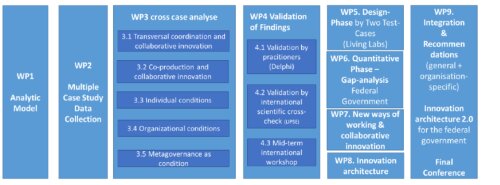Methodology
In this research project we tackle the research questions by a participative multi-method design. The project combines qualitative, quantitative and design-based methods in line with what is advocated by pioneering researchers on collaborative innovation. Moreover, the research project itself is meant to be a collaborative process in which the commissioning government, their civil servants and stakeholders are intensively involved in various stages and through various instruments (e.g., discussion of analytical framework; case study selection; validation of case study findings through Delphi; pilot-testing; and quantitative gap-analysis). The project uses multiple methods to address the research questions, combining (1) a multiple case study phase, (2) a validation phase (Delphi and international validation), (3) a design-phase with two test cases, using Living Lab methodology and (4) a gap-analysis phase, using quantitative survey data, and (5) this in an international comparative set-up.
The figure below shows the set-up of the project. The project itself is designed to be a collaborative process in which the commissioning government, their civil servants and stakeholders are involved in various stages and through various instruments
